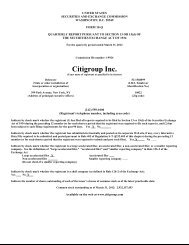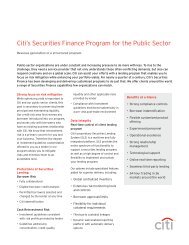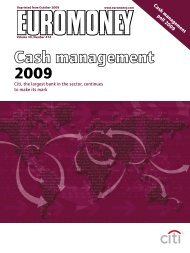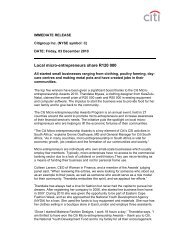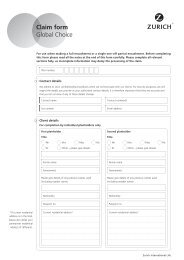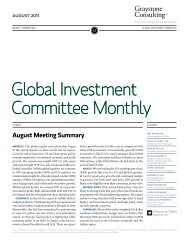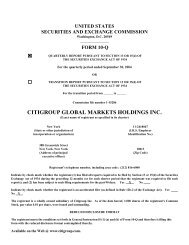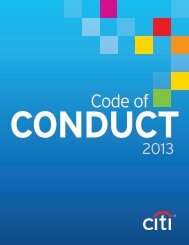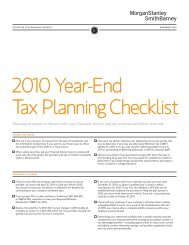Credit Commitments and Lines of CreditThe table below summarizes <strong>Citigroup</strong>’s credit commitments as of December 31, 2010 and December 31, 2009:In millions of dollarsU.S.December 31, 2010Outside ofU.S. TotalDecember 31,2009Commercial and similar letters of credit $ 1,544 $ 7,430 $ 8,974 $ 7,211One- to four-family residential mortgages 2,582 398 2,980 1,070Revolving open-end loans secured by one- to four-family residential properties 17,986 2,948 20,934 23,916Commercial real estate, construction and land development 1,813 594 2,407 1,704Credit card lines 573,945 124,728 698,673 785,495Commercial and other Consumer loan commitments 124,142 86,262 210,404 257,342Total $722,012 $222,360 $944,372 $1,076,738The majority of unused commitments are contingent upon customersmaintaining specific credit standards. Commercial commitments generallyhave floating interest rates and fixed expiration dates and may requirepayment of fees. Such fees (net of certain direct costs) are deferred and, uponexercise of the commitment, amortized over the life of the loan or, if exerciseis deemed remote, amortized over the commitment period.Commercial and similar letters of creditA commercial letter of credit is an instrument by which <strong>Citigroup</strong> substitutesits credit for that of a customer to enable the customer to finance thepurchase of goods or to incur other commitments. <strong>Citigroup</strong> issues a letteron behalf of its client to a supplier and agrees to pay the supplier uponpresentation of documentary evidence that the supplier has performed inaccordance with the terms of the letter of credit. When a letter of credit isdrawn, the customer is then required to reimburse <strong>Citigroup</strong>.One- to four-family residential mortgagesA one- to four-family residential mortgage commitment is a writtenconfirmation from <strong>Citigroup</strong> to a seller of a property that the bank willadvance the specified sums enabling the buyer to complete the purchase.Revolving open-end loans secured by one- to four-familyresidential propertiesRevolving open-end loans secured by one- to four-family residentialproperties are essentially home equity lines of credit. A home equity line ofcredit is a loan secured by a primary residence or second home to the extentof the excess of fair market value over the debt outstanding for the firstmortgage.Commercial real estate, construction and landdevelopmentCommercial real estate, construction and land development includeunused portions of commitments to extend credit for the purpose offinancing commercial and multifamily residential properties as well as landdevelopment projects.Both secured-by-real-estate and unsecured commitments are included inthis line, as well as undistributed loan proceeds, where there is an obligationto advance for construction progress payments. However, this line onlyincludes those extensions of credit that, once funded, will be classified asLoans on the Consolidated Balance Sheet.Credit card lines<strong>Citigroup</strong> provides credit to customers by issuing credit cards. The credit cardlines are unconditionally cancelable by the issuer.Commercial and other Consumer loan commitmentsCommercial and other Consumer loan commitments include overdraft andliquidity facilities, as well as commercial commitments to make or purchaseloans, to purchase third-party receivables, to provide note issuance orrevolving underwriting facilities and to invest in the form of equity. Amountsinclude $79 billion and $126 billion with an original maturity of less thanone year at December 31, 2010 and December 31, 2009, respectively.In addition, included in this line item are highly leveraged financingcommitments, which are agreements that provide funding to a borrower withhigher levels of debt (measured by the ratio of debt capital to equity capitalof the borrower) than is generally considered normal for other companies.This type of financing is commonly employed in corporate acquisitions,management buy-outs and similar transactions.282
29. CONTINGENCIESOverviewIn addition to the matters described below, in the ordinary course of business,<strong>Citigroup</strong> and its affiliates and subsidiaries and current and former officers,directors and employees (for purposes of this section, sometimes collectivelyreferred to as <strong>Citigroup</strong> and Related Parties) routinely are named asdefendants in, or as parties to, various legal actions and proceedings. Certainof these actions and proceedings assert claims or seek relief in connectionwith alleged violations of consumer protection, securities, banking,antifraud, antitrust, anti-money laundering, employment and other statutoryand common laws. Certain of these actual or threatened legal actions andproceedings include claims for substantial or indeterminate compensatory orpunitive damages, or for injunctive relief.In the ordinary course of business, <strong>Citigroup</strong> and Related Parties alsoare subject to governmental and regulatory examinations, informationgatheringrequests, investigations and proceedings (both formal andinformal), certain of which may result in adverse judgments, settlements,fines, penalties, injunctions or other relief. Certain affiliates and subsidiariesof <strong>Citigroup</strong> are banks, registered broker-dealers, futures commissionmerchants, investment advisers or other regulated entities and, in thosecapacities, are subject to regulation by various U.S., state and foreignsecurities, banking, commodity futures and other regulators. In connectionwith formal and informal inquiries by these regulators, <strong>Citigroup</strong> and suchaffiliates and subsidiaries receive numerous requests, subpoenas and ordersseeking documents, testimony and other information in connection withvarious aspects of their regulated activities.Because of the global scope of <strong>Citigroup</strong>’s operations, and its presencein countries around the world, <strong>Citigroup</strong> and Related Parties are subject tolitigation, and governmental and regulatory examinations, informationgatheringrequests, investigations and proceedings (both formal andinformal), in multiple jurisdictions with legal and regulatory regimes thatmay differ substantially, and present substantially different risks, from those<strong>Citigroup</strong> and Related Parties are subject to in the United States.<strong>Citigroup</strong> seeks to resolve all litigation and regulatory matters in themanner management believes is in the best interests of <strong>Citigroup</strong> and itsshareholders, and contests liability, allegations of wrongdoing and, whereapplicable, the amount of damages or scope of any penalties or other reliefsought as appropriate in each pending matter.Accounting and Disclosure FrameworkASC 450 (formerly SFAS 5) governs the disclosure and recognition of losscontingencies, including potential losses from litigation and regulatorymatters. ASC 450 defines a “loss contingency” as “an existing condition,situation, or set of circumstances involving uncertainty as to possible lossto an entity that will ultimately be resolved when one or more future eventsoccur or fail to occur.” It imposes different requirements for the recognitionand disclosure of loss contingencies based on the likelihood of occurrenceof the contingent future event or events. It distinguishes among degrees oflikelihood using the following three terms: “probable,” meaning that “thefuture event or events are likely to occur”; “remote,” meaning that “thechance of the future event or events occurring is slight”; and “reasonablypossible,” meaning that “the chance of the future event or events occurringis more than remote but less than likely.” These three terms are used belowas defined in ASC 450.Accruals. ASC 450 requires accrual for a loss contingency when it is“probable that one or more future events will occur confirming the factof loss” and “the amount of the loss can be reasonably estimated.” Inaccordance with ASC 450, <strong>Citigroup</strong> establishes accruals for all litigationand regulatory matters, including matters disclosed herein, when <strong>Citigroup</strong>believes it is probable that a loss has been incurred and the amount of theloss can be reasonably estimated. When the reasonable estimate of the loss iswithin a range of amounts, the minimum amount of the range is accrued,unless some higher amount within the range is a better estimate than anyother amount within the range. Once established, accruals are adjusted fromtime to time, as appropriate, in light of additional information. The amountof loss ultimately incurred in relation to those matters may be substantiallyhigher or lower than the amounts accrued for those matters.Disclosure. ASC 450 requires disclosure of a loss contingency if “there isat least a reasonable possibility that a loss or an additional loss may havebeen incurred” and there is no accrual for the loss because the conditionsdescribed above are not met or an exposure to loss exists in excess of theamount accrued. In accordance with ASC 450, if <strong>Citigroup</strong> has not accruedfor a matter because <strong>Citigroup</strong> believes that a loss is reasonably possiblebut not probable, or that a loss is probable but not reasonably estimable,and the matter therefore does not meet the criteria for accrual, it disclosesthe loss contingency. In addition, <strong>Citigroup</strong> discloses matters for which ithas accrued if it believes an exposure to loss exists in excess of the amountaccrued. In accordance with ASC 450, <strong>Citigroup</strong>’s disclosure includes anestimate of the reasonably possible loss or range of loss for those matters asto which an estimate can be made. ASC 450 does not require disclosure of anestimate of the reasonably possible loss or range of loss where an estimatecannot be made. Neither accrual nor disclosure is required for losses that aredeemed remote.Inherent Uncertainty of the Matters Disclosed. Certain of the mattersdisclosed below involve claims for substantial or indeterminate damages.The claims asserted in these matters typically are broad, often spanning amulti-year period and sometimes a wide range of business activities, andthe plaintiffs’ or claimants’ alleged damages frequently are not quantifiedor factually supported in the complaint or statement of claim. As a result,<strong>Citigroup</strong> is often unable to estimate the loss in such matters, even if itbelieves that a loss is probable or reasonably possible, until developmentsin the case have yielded additional information sufficient to support aquantitative assessment of the range of reasonably possible loss. Suchdevelopments may include, among other things, discovery from adverseparties or third parties, rulings by the court on key issues, analysis byretained experts, and engagement in settlement negotiations. Dependingon a range of factors, such as the complexity of the facts, the novelty of thelegal theories, the pace of discovery, the court’s scheduling order, the timingof court decisions, and the adverse party’s willingness to negotiate in goodfaith towards a resolution, it may be months or years after the filing of a casebefore an estimate of the range of reasonably possible loss can be made.Matters as to Which an Estimate Can Be Made. For some of the mattersdisclosed below, <strong>Citigroup</strong> is currently able to estimate a reasonably possibleloss or range of loss in excess of amounts accrued (if any). For some of the283
- Page 1 and 2:
UNITED STATESSECURITIES AND EXCHANG
- Page 3 and 4:
CITIGROUP’S 2010 ANNUAL REPORT ON
- Page 5 and 6:
As described above, Citigroup is ma
- Page 7 and 8:
Operating ExpensesCitigroup operati
- Page 9 and 10:
FIVE-YEAR SUMMARY OF SELECTED FINAN
- Page 11 and 12:
CITIGROUP REVENUESIn millions of do
- Page 13 and 14:
REGIONAL CONSUMER BANKINGRegional C
- Page 15 and 16:
2009 vs. 2008Revenues, net of inter
- Page 17 and 18:
2009 vs. 2008Revenues, net of inter
- Page 19 and 20:
2009 vs. 2008Revenues, net of inter
- Page 21 and 22:
2009 vs. 2008Revenues, net of inter
- Page 23 and 24:
SECURITIES AND BANKINGSecurities an
- Page 25 and 26:
TRANSACTION SERVICESTransaction Ser
- Page 27 and 28:
BROKERAGE AND ASSET MANAGEMENTBroke
- Page 29 and 30:
Japan Consumer FinanceCitigroup con
- Page 31 and 32:
The following table provides detail
- Page 33 and 34:
CORPORATE/OTHERCorporate/Other incl
- Page 35 and 36:
During 2010, average Consumer loans
- Page 37 and 38:
SEGMENT BALANCE SHEET AT DECEMBER 3
- Page 39 and 40:
Citigroup Regulatory Capital Ratios
- Page 41 and 42:
Capital Resources of Citigroup’s
- Page 43 and 44:
Regulatory Capital Standards Develo
- Page 45 and 46:
DepositsCiti continues to focus on
- Page 47 and 48:
Secured financing is primarily cond
- Page 49 and 50:
Each of the credit rating agencies
- Page 51 and 52:
RISK FACTORSThe ongoing implementat
- Page 53 and 54:
The emerging markets in which Citi
- Page 55 and 56:
is largely uncertain. However, any
- Page 57 and 58:
a short-term Liquidity Coverage Rat
- Page 59 and 60:
understanding or cause confusion ac
- Page 61 and 62:
MANAGING GLOBAL RISKRISK MANAGEMENT
- Page 63 and 64:
CREDIT RISKCredit risk is the poten
- Page 65 and 66:
[This page intentionally left blank
- Page 67 and 68:
(1) 2010 primarily includes an addi
- Page 69 and 70:
Non-Accrual Loans and AssetsThe tab
- Page 71 and 72:
Renegotiated LoansThe following tab
- Page 73 and 74:
Citi’s first mortgage portfolio i
- Page 75 and 76:
Consumer Mortgage FICO and LTVData
- Page 77 and 78:
Second Mortgages: December 31, 2010
- Page 79 and 80:
Interest Rate Risk Associated with
- Page 81 and 82:
North America Cards—FICO Informat
- Page 83 and 84:
CONSUMER LOAN DETAILSConsumer Loan
- Page 85 and 86:
Consumer Loan Modification Programs
- Page 87 and 88:
North America CardsNorth America ca
- Page 89 and 90:
Payment deferrals that do not conti
- Page 91 and 92:
Repurchase ReserveCiti has recorded
- Page 93 and 94:
Securities and Banking-Sponsored Pr
- Page 95 and 96:
The following table presents the co
- Page 97 and 98:
MARKET RISKMarket risk encompasses
- Page 99 and 100:
Trading PortfoliosPrice risk in tra
- Page 101 and 102:
INTEREST REVENUE/EXPENSE AND YIELDS
- Page 103 and 104:
AVERAGE BALANCES AND INTEREST RATES
- Page 105 and 106:
ANALYSIS OF CHANGES IN INTEREST EXP
- Page 107 and 108:
[This page intentionally left blank
- Page 109 and 110:
As required by SEC rules, the table
- Page 111 and 112:
The credit valuation adjustment amo
- Page 113 and 114:
The fair values shown are prior to
- Page 115 and 116:
Key Controls over Fair Value Measur
- Page 117 and 118:
The following table reflects the in
- Page 119 and 120:
The results of the July 1, 2010 tes
- Page 121 and 122:
As a result of the losses incurred
- Page 123 and 124:
MANAGEMENT’S ANNUAL REPORT ON INT
- Page 125 and 126:
• an “ownership change” under
- Page 127 and 128:
REPORT OF INDEPENDENT REGISTERED PU
- Page 129 and 130:
FINANCIAL STATEMENTS AND NOTES TABL
- Page 131 and 132:
CONSOLIDATED FINANCIAL STATEMENTSCO
- Page 133 and 134:
CONSOLIDATED BALANCE SHEET(Continue
- Page 135 and 136:
CONSOLIDATED STATEMENT OF CHANGES I
- Page 137 and 138:
CITIBANK CONSOLIDATED BALANCE SHEET
- Page 139 and 140:
NOTES TO CONSOLIDATED FINANCIAL STA
- Page 141 and 142:
Repurchase and Resale AgreementsSec
- Page 143 and 144:
ecoveries are added. Securities rec
- Page 145 and 146:
Consumer Mortgage Representations a
- Page 147 and 148:
Transfers of Financial AssetsFor a
- Page 149 and 150:
ACCOUNTING CHANGESChange in Account
- Page 151 and 152:
The following table reflects the in
- Page 153 and 154:
Measuring Liabilities at Fair Value
- Page 155 and 156:
Revisions to the Earnings-per-Share
- Page 157 and 158:
FUTURE APPLICATION OF ACCOUNTING ST
- Page 159 and 160:
3. DISCONTINUED OPERATIONSSale of T
- Page 161 and 162:
CitiCapitalOn July 31, 2008, Citigr
- Page 163 and 164:
5. INTEREST REVENUE AND EXPENSEFor
- Page 165 and 166:
Stock Award ProgramsCitigroup issue
- Page 167 and 168:
In January 2009, members of the Man
- Page 169 and 170:
Information with respect to stock o
- Page 171 and 172:
9. RETIREMENT BENEFITSThe Company h
- Page 173 and 174:
The following table shows the chang
- Page 175 and 176:
A one-percentage-point change in th
- Page 177 and 178:
Level 3 Roll ForwardThe reconciliat
- Page 179 and 180:
10. INCOME TAXESIn millions of doll
- Page 181 and 182:
The Company is currently under audi
- Page 183 and 184:
11. EARNINGS PER SHAREThe following
- Page 185 and 186:
13. BROKERAGE RECEIVABLES AND BROKE
- Page 187 and 188:
The table below shows the fair valu
- Page 189 and 190:
Debt Securities Held-to-MaturityThe
- Page 191 and 192:
Evaluating Investments for Other-Th
- Page 193 and 194:
The following is a 12-month roll-fo
- Page 195 and 196:
16. LOANSCitigroup loans are report
- Page 197 and 198:
Residential Mortgage Loan to Values
- Page 199 and 200:
The following table presents Corpor
- Page 201 and 202:
Included in the Corporate and Consu
- Page 203 and 204:
18. GOODWILL AND INTANGIBLE ASSETSG
- Page 205 and 206:
Intangible AssetsThe components of
- Page 207 and 208:
CGMHI has committed long-term finan
- Page 209 and 210:
20. Regulatory CapitalCitigroup is
- Page 211 and 212: 22. SECURITIZATIONS AND VARIABLE IN
- Page 213 and 214: In millions of dollars As of Decemb
- Page 215 and 216: Funding Commitments for Significant
- Page 217 and 218: Credit Card SecuritizationsThe Comp
- Page 219 and 220: Managed Loans—Citi HoldingsThe fo
- Page 221 and 222: Key assumptions used in measuring t
- Page 223 and 224: Mortgage Servicing RightsIn connect
- Page 225 and 226: The Company administers one conduit
- Page 227 and 228: Key Assumptions and Retained Intere
- Page 229 and 230: Municipal InvestmentsMunicipal inve
- Page 231 and 232: Derivative NotionalsIn millions of
- Page 233 and 234: activities together with gains and
- Page 235 and 236: Cash Flow HedgesHedging of benchmar
- Page 237 and 238: The range of credit derivatives sol
- Page 239 and 240: 24. CONCENTRATIONS OF CREDIT RISKCo
- Page 241 and 242: Trading account assets and liabilit
- Page 243 and 244: The internal valuation techniques u
- Page 245 and 246: In millions of dollars at December
- Page 247 and 248: Changes in Level 3 Fair Value Categ
- Page 249 and 250: In millions of dollarsDecember 31,2
- Page 251 and 252: 26. FAIR VALUE ELECTIONSThe Company
- Page 253 and 254: The following table provides inform
- Page 255 and 256: Certain structured liabilitiesThe C
- Page 257 and 258: 28. PLEDGED SECURITIES, COLLATERAL,
- Page 259 and 260: The repurchase reserve estimation p
- Page 261: CollateralCash collateral available
- Page 265 and 266: pursuant to which Citigroup agreed
- Page 267 and 268: court filings under docket number 0
- Page 269 and 270: 30. CITIBANK, N.A. STOCKHOLDER’S
- Page 271 and 272: Condensed Consolidating Statements
- Page 273 and 274: Condensed Consolidating Statements
- Page 275 and 276: Condensed Consolidating Balance She
- Page 277 and 278: Condensed Consolidating Statements
- Page 279 and 280: 33. SELECTED QUARTERLY FINANCIAL DA
- Page 281 and 282: SUPERVISION AND REGULATIONCitigroup
- Page 283 and 284: Citigroup continues to evaluate its
- Page 285 and 286: CORPORATE INFORMATIONCITIGROUP EXEC
- Page 287 and 288: SignaturesPursuant to the requireme



